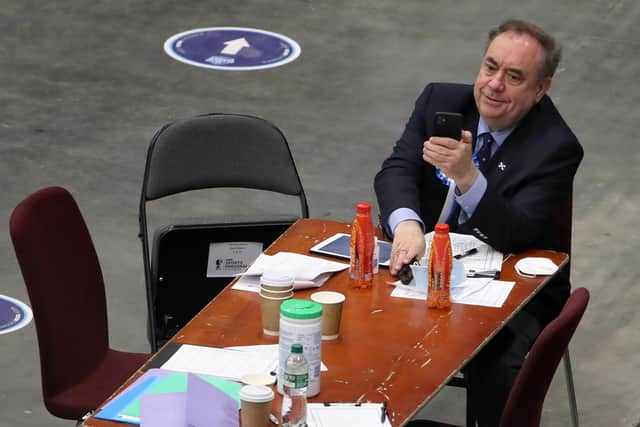Scottish election 2021 results: Did Alba and All for Unity impact the result and were the polls right?
Alba and All for Unity
For these two new parties, led by two former heavyweights of Scottish politics in Alex Salmond and George Galloway, their aim was to disrupt the political establishment and promote tactical voting for a constitutional cause.
In essence, both parties wanted voters to back them instead of the dominant pro-independence or pro-union parties to win additional seats of the regional list, unencumbered by any gains on the constituency ballot.


The results, however, were dreadful.
Advertisement
Hide AdAdvertisement
Hide AdNot only did Alba fail to register more than 2 per cent of the vote share in any one of the eight regional lists, their votes made no difference to the overall result. Adding Alba’s votes on to the SNP’s changes nothing in the overall d’Hondt calculations.
This means, to the SNP’s relief, there were no additional seats to be won had Alba not existed.
However, while there will be some within the newest pro-independence party who feel their argument around “wasted” list votes has been vindicated, the data also shows the risk to the SNP's final seat tally was clear.
Had 4,000 more SNP voters in South Scotland – just 1.1 per cent of those who turned out – backed Alba, Nicola Sturgeon’s party would have lost their only list seat in the region to the Scottish Greens, with Alba still more than 11,000 votes away from winning the seat itself.
Even in the North East, Alex Salmond’s political heartland, Alba was at least 11,731 votes short of winning a seat with a hypothetical vote share of 5.7 per cent.
In All for Unity’s case, had all of their voters backed the Scottish Conservatives, the only change would have been the order in which Labour and the Conservatives would have received their list seats.
Most notably, Douglas Ross’s party would have beaten Labour to the first list seat in Glasgow.
There was concern from within the Conservatives that All for Unity had denied the party a fourth list seat in South Scotland.
Advertisement
Hide AdAdvertisement
Hide AdWhile the 5,521 votes for the party would have seen the Tories get closer to that final list spot, they would have required an additional 14,000 votes to beat Scottish Labour and the Scottish Greens to the final seat.
How accurate were the polls?
In terms of the overall vote share for each party on the constituency ballot and regional list, pollsters had mixed results.
Opinium, who undertook research for Sky News, were within one point of the final result on the regional list when compared to other pollsters who consistently over-stated Green support and under-stated SNP support.
In terms of the constituency ballot, it was Survation’s final poll which was the closest, with the pollsters also within one point of the final overall result.
The overall average of the final five polls ahead of the election when combining the research by Opinium, Ipsos Mori, Survation, Savanta ComRes and YouGov, was consistently within 1 per cent of the final result.
However, the polls had a tendency to understate SNP list support and overstate support for the Scottish Greens.
A message from the Editor:
Thank you for reading this article. We're more reliant on your support than ever as the shift in consumer habits brought about by coronavirus impacts our advertisers.
If you haven't already, please consider supporting our trusted, fact-checked journalism by taking out a digital subscription.
Comments
Want to join the conversation? Please or to comment on this article.
